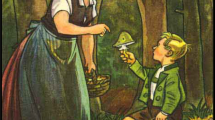Abstract
Scholars have long recognized that the Old English Judges has aims extending well beyond translation. However, to classify the entire work as a homily would be to disregard the fact that not all of its parts answer to the same aim or genre. This article argues that the text’s inclusion of Samson’s biography is of no relevance to the moral lesson that seems to speak from both the biblical material that precedes it and the extrabiblical material that follows. The text may nevertheless be understood as a single work, crafted to relay the contents of the biblical Book of Judges to a lay audience while emphasizing that its implications for personal conduct remained valid in Anglo-Saxon times.
Similar content being viewed by others
Notes
“Ðis gewrit wæs to anum men gediht ac hit mæg swa ðeah manegum fremian” (Marsden 201). We cannot, of course, be certain who prepended this message.
I am grateful to Winfried Rudolf and Christine Voth for lighting the way to this conclusion (personal communication, December 2014–January 2015).
I am grateful to Stephen Pelle for extracting these data.
It should be borne in mind, of course, that some of Pope’s more general observations may lean on Judges among other texts as evidence of Ælfric’s later works. Since he does not, as a rule, cull his examples from this text, however, the danger of circular reasoning is limited.
References
Anderson, R. (2007). The Old Testament homily: Ælfric as biblical translator. In A. Kleist (Ed.), The Old English homily: Precedent, practice, and appropriation, Studies in the Early Middle Ages 17 (pp. 121–142). Turnhout: Brepols.
Assmann, B. (Ed.). (1889). Angelsächsische Homilien und Heiligenleben. Bibliothek der angelsächsischen Prosa 3. Kassel: Wigand.
Bethurum, D. (Ed.). (1957). The homilies of Wulfstan. Oxford: Clarendon.
Cameron, A., Amos, A. C., & Healey, A. diP., et al. (Eds.). (2007). Dictionary of Old English: A to G online. Toronto: Dictionary of Old English Project. http://www.doe.utoronto.ca. Accessed January 9, 2015; intranet server queried for Ælfrician vocabulary on 24 November 2014.
Crawford, S. J. (Ed.). (1922). The Old English version of the Heptateuch, Ælfric’s treatise on the Old and New Testament, and his preface to Genesis. Early English Text Society o.s. 160. London: Oxford University Press.
Cubitt, C. (2009). Ælfric’s lay patrons. In H. Magennis & M. Swan (Eds.), A companion to Ælfric (pp. 165–192). Leiden: Brill.
Dietrich, E. (1855). Abt Aelfrik: Zur Literatur-Geschichte der angelsächsischen Kirche [I]. Zeitschrift für die historische Theologie, 25(4), 487–594.
Gneuss, H., & Lapidge, M. (2014). Anglo-Saxon manuscripts: A bibliographical handlist of manuscripts and manuscript fragments written or owned in England up to 1100. Toronto Anglo-Saxon series. Toronto: University of Toronto Press.
Grein, C. W. M. (Ed.). (1872). Liber iudicum. Älfrik de vetere et novo testamento, Pentateuch, Iosua, Buch der Richter und Hiob, Bibliothek der angelsächsischen Prosa 1 (pp. 253–265). Kassel and Göttingen: Wigand.
Grein, C. W. M. (Ed.). (1879). Ælfric’s metrischer Auszug aus dem Buch der Richter. Reprinted in metrical lines and introduced by Richard Paul Wülcker. Anglia 2, 141–152.
Healey, A. diP., Wilkin, J. P., & Xiang, X. (Eds.). (2009). Dictionary of Old English web corpus. Toronto: Dictionary of Old English Project. http://tapor.library.utoronto.ca/doecorpus/. Accessed January 11, 2015.
Jacob, W., & Hanslik, R. (Eds.). (1952). Cassiodori-Epiphanii Historia ecclesiastica tripartita, Corpus Scriptorum Ecclesiasticorum Latinorum 71. Vienna: Hoelder, Pichler, and Tempsky.
Keefer, S. L. (2003). In closing: Amen and doxology in Anglo-Saxon England. Anglia, 121(2), 210–237.
Ker, N. R. (Ed.). (1957). Catalogue of manuscript containing Anglo-Saxon. Oxford: Clarendon.
Marsden, R. (Ed.). (2008). The Old English Heptateuch and Ælfric’s Libellus de veteri testamento et novo. I: Introduction and Text. Early English Text Society o.s. 330. Oxford: Oxford University Press.
Morin, D. G. (Ed.). (1953). Sancti Caesarii Arelatensis sermones. I, Corpus Christianorum Series Latina 103 (2nd ed). Turnhout: Brepols.
Napier, A. (Ed.). (1883). Wulfstan: Sammlung der ihm zugeschriebenen Homilien nebst Untersuchungen über ihre Echtheit. I: Text und Varianten. Berlin: Weidmann.
Pope, J. C. (Ed.). (1967). Homilies of Ælfric: A supplementary collection. I, Early English Text Society o.s. 259. Oxford: Oxford University Press.
Schipper, J. (1881). Englische Metrik. I: Altenglische Metrik. Bonn: Strauss.
Skeat, W. W. (Ed.). (1881–1900). Ælfric’s Lives of Saints, 4 vols. Early English Text Society 76, 82, 94, 114. London: Oxford; Repr. in 2 volumes 1966.
Thwaites, E. (Ed.). (1698). Heptateuchus, Liber Job, et Evangelium Nicodemi; Anglo-Saxonice. Historiæ Judith Fragmentum; Dano-Saxonice. Oxford: Sheldonian Theatre.
Wanleius, H. (1705). Librorum Vett. Septentrionalium, qui in Angliæ Bibliothecis extant, nec non multorum Vett. Codd. Septentrionalium alibi extantium Catalogus Historico-Criticus, cum totius Thesauri Linguarum Septentrionalium sex Indicibus. Antiquæ literaturæ septentrionalis 2. Oxford: Sheldonian Theatre.
Author information
Authors and Affiliations
Corresponding author
Rights and permissions
About this article
Cite this article
Langeslag, P.S. Reverse-Engineering the Old English Book of Judges . Neophilologus 100, 303–314 (2016). https://doi.org/10.1007/s11061-015-9456-2
Published:
Issue Date:
DOI: https://doi.org/10.1007/s11061-015-9456-2




